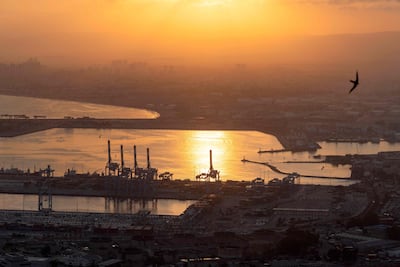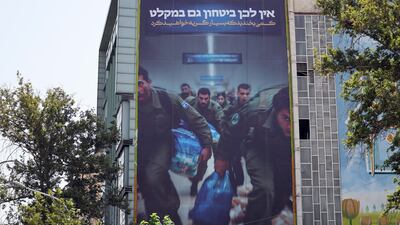Live updates: Follow the latest on Israel-Gaza
Israel is bracing for a major attack as fears mount that spiralling tension in the Middle East could lead to unprecedented strikes on the country by its regional adversaries.
The Israeli military is also preparing for the possibility of a significant attack on its air defence systems, it said on Monday.
“Israel must protect, first and foremost, its vital capabilities such as air force bases, military headquarters and vital infrastructure,” Brig Gen Amir Avivi told The National.
“We’ll do everything we can to defend the cities but if the attack is overwhelming, there is no 100 per cent. There might be hits.
“Iran and Hezbollah need to take into account that if this happens, there will be a full-scale war. They will pay heavily for attacking us.”
Israel’s military spokesman said on Sunday that there was “no change in the defence policy of the Home Front Command”, the military body responsible for civilian protection.
Brig Gen Avivi said this would only change when “there is specific intelligence that says an attack is about to happen or under way”.
“A big part of Israel’s ability to deal with this long war is keeping the economy flowing and society resilient. A big part of that resilience is keeping everyday life normal as much as possible,” he added.
In the northern port city of Haifa, a possible Hezbollah target, the municipality cancelled events involving large gatherings.
Authorities are also removing hazardous materials from the port, which is vital to the country’s economy.
While Israel and Hezbollah have been trading fire since October 8, the situation rapidly deteriorated last week after a senior Hezbollah commander was killed in Beirut and Hamas political leader Ismail Haniyeh was assassinated in Tehran, attacks widely believed to have been carried out by Israel.
Tawfik, 21, a resident of the city of Akka, north of Haifa, told The National that the situation was critical and “countries and institutions must address it before we descend into a regional escalation that will be difficult to escape from”.
Adel, also a resident of Akka, is less concerned. “I don’t care. No one’s stockpiling. I don’t think Iran’s retaliation will be that big. It’s already in the middle of an effective retaliation: terrifying the Israeli populace,” he said.

Israeli authorities have long acknowledged that there could be major disruptions to electricity, water and communications infrastructure in the event of a large-scale attack by Lebanese militant group Hezbollah, Iran and its regional proxies.
US Secretary of State Antony Blinken told G7 counterparts on Sunday that an Iran-Hezbollah attack on Israel could happen as early as Monday, news website Axios reported.
A number of foreign countries have updated travel advice for Israel, with some urging citizens to avoid all travel.
Last week, the Home Front Command unveiled new technology that sends personal messages to phone users in an area suddenly deemed to be in danger.
The country’s ambulance service also completed a major drill last week simulating a widespread attack on Israel that could lead to communication disruptions and mass casualties.
Brig Gen Avivi said Israel was in “full readiness” and that there was “also very tight co-operation with the global coalition led by the US to defend against a possibly Iranian or Hezbollah attack”.
The US galvanised an international coalition that intercepted projectiles during an Iranian attack on Israel in April.
Israeli Defence Minister Yoav Gallant briefed US counterpart Lloyd Austin on Monday night about the situation in the region.
Mr Gallant discussed “a series of scenarios and corresponding defensive and offensive capabilities”, his office said.
He also “highlighted the importance of US leadership in forming a coalition of allies and partners to defend Israel and the region from a range of aerial attacks”.
There are fears this time that the US will struggle to muster the same number of allies, particularly among Arab states.
But Brig Gen Avivi said that the coalition was stronger than it was in April, citing forces that the US has moved to the region recently and high-level political visits from allied states, such as last week's trip to Tel Aviv by the UK’s military chief Admiral Sir Tony Radakin.


